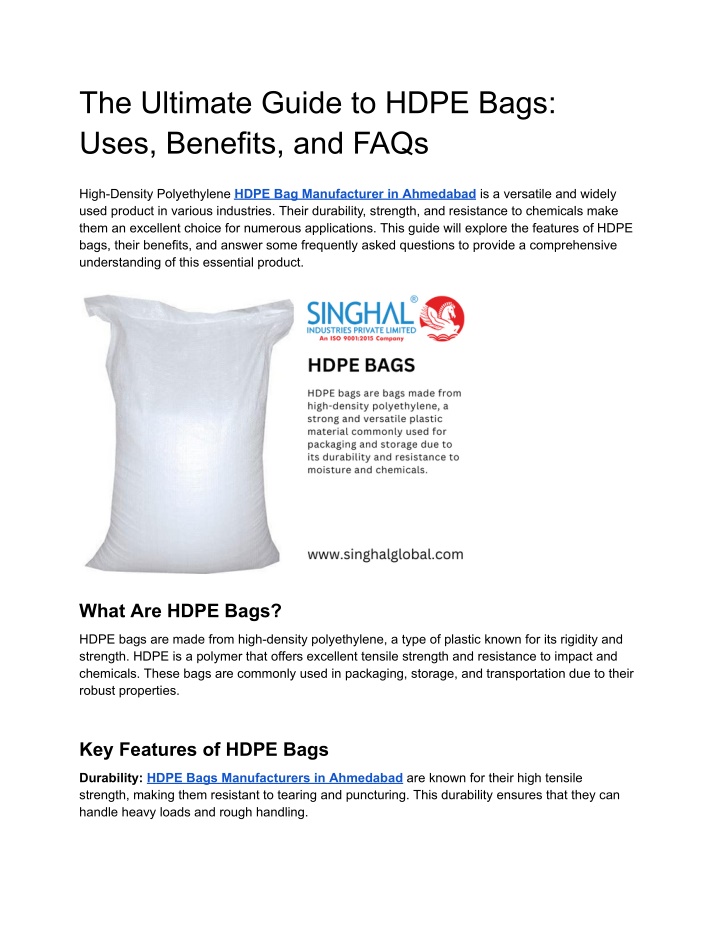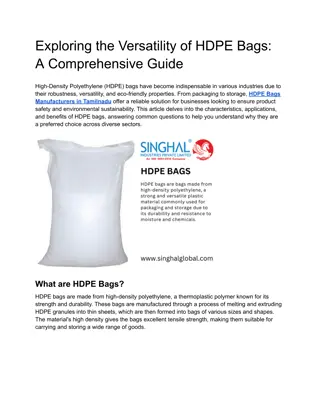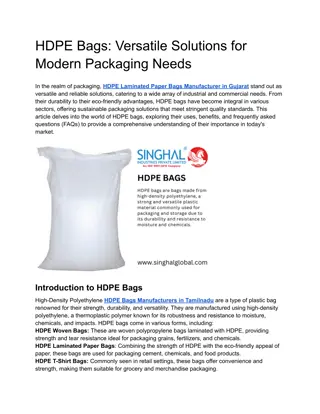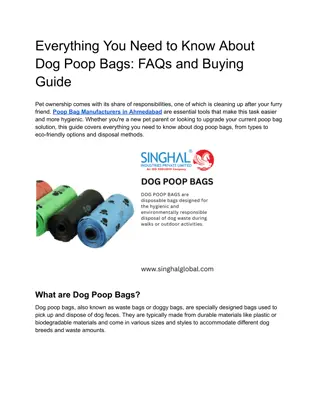
Top HDPE Bag Manufacturer in Ahmedabad: Quality You Can Trust
Looking for a reliable HDPE bag manufacturer in Ahmedabad? Look no further! Our company stands out as a premier producer of high-density polyethylene (HDPE) bags, known for their durability, strength, and versatility. We cater to diverse industries,
Download Presentation

Please find below an Image/Link to download the presentation.
The content on the website is provided AS IS for your information and personal use only. It may not be sold, licensed, or shared on other websites without obtaining consent from the author. If you encounter any issues during the download, it is possible that the publisher has removed the file from their server.
You are allowed to download the files provided on this website for personal or commercial use, subject to the condition that they are used lawfully. All files are the property of their respective owners.
The content on the website is provided AS IS for your information and personal use only. It may not be sold, licensed, or shared on other websites without obtaining consent from the author.
E N D
Presentation Transcript
The Ultimate Guide to HDPE Bags: Uses, Benefits, and FAQs High-Density Polyethylene HDPE Bag Manufacturer in Ahmedabad is a versatile and widely used product in various industries. Their durability, strength, and resistance to chemicals make them an excellent choice for numerous applications. This guide will explore the features of HDPE bags, their benefits, and answer some frequently asked questions to provide a comprehensive understanding of this essential product. What Are HDPE Bags? HDPE bags are made from high-density polyethylene, a type of plastic known for its rigidity and strength. HDPE is a polymer that offers excellent tensile strength and resistance to impact and chemicals. These bags are commonly used in packaging, storage, and transportation due to their robust properties. Key Features of HDPE Bags Durability: HDPE Bags Manufacturers in Ahmedabad are known for their high tensile strength, making them resistant to tearing and puncturing. This durability ensures that they can handle heavy loads and rough handling.
Chemical Resistance: HDPE has a natural resistance to chemicals, which makes these bags ideal for storing and transporting various substances, including food items, chemicals, and pharmaceuticals. Water Resistance: The low moisture absorption rate of HDPE means that these bags can keep their contents dry and protected from moisture and other environmental factors. Recyclability: HDPE is recyclable, which makes these bags an environmentally friendly choice compared to some other types of plastic. Recycled HDPE bags can be repurposed for various applications, contributing to a circular economy. Cost-Effectiveness: HDPE bags are relatively inexpensive to produce and purchase, making them a cost-effective option for businesses and consumers alike. Common Uses of HDPE Bags Retail Packaging: HDPE Bags Manufacturers in Nagpur are often used by retailers for shopping bags. Their durability makes them suitable for carrying groceries, clothing, and other products. Industrial Applications: In the industrial sector, HDPE bags are used for packaging bulk materials such as grains, powders, and chemicals. Their strength ensures that they can handle the demands of industrial environments. Medical and Pharmaceutical: Due to their chemical resistance and ability to maintain hygiene, HDPE bags are used in the medical and pharmaceutical industries for packaging and storing medical supplies and medications. Food Industry: The food industry utilizes HDPE bags for packaging various food products. Their resistance to moisture and chemicals helps in preserving the freshness and safety of food items. Agricultural Use: HDPE bags are employed in agriculture for storing seeds, fertilizers, and other agricultural products. Their durability ensures that they can withstand outdoor conditions. Benefits of HDPE Bags Strength and Reliability: The primary benefit of HDPE bags is their strength. They can carry heavy loads without breaking, making them a reliable choice for various applications. Versatility: HDPE bags come in various sizes, shapes, and designs, making them suitable for numerous uses, from small retail bags to large industrial sacks. Environmental Impact: While plastic use has environmental concerns, HDPE bags are more sustainable than some other plastics due to their recyclability. Many facilities have recycling programs in place for HDPE bags. Customizability: HDPE bags can be customized with logos, colors, and sizes to meet specific business needs. This customization helps in brand promotion and meeting the requirements of different industries.
Conclusion HDPE bags are a vital component in various industries due to their durability, chemical resistance, and cost-effectiveness. From retail and industrial applications to food and medical use, these bags offer a reliable solution for many packaging needs. By understanding their features and benefits, you can make informed choices about using HDPE bags for your specific requirements. As recycling options continue to expand, HDPE bags also offer a more sustainable choice compared to some other types of plastic, supporting efforts toward a greener future. Frequently Asked Questions (FAQs) About HDPE Bags 1. What is the difference between HDPE and LDPE bags? HDPE (High-Density Polyethylene) and LDPE (Low-Density Polyethylene) bags are made from different types of polyethylene, resulting in distinct properties. HDPE bags are more rigid and have higher tensile strength, making them more suitable for carrying heavy loads and providing durability. In contrast, LDPE bags are softer, more flexible, and are often used for applications requiring a more pliable material. 2. Are HDPE bags safe for food storage? Yes, HDPE bags are generally safe for food storage. They are used in the food industry due to their resistance to moisture and chemicals, which helps in preserving the quality and safety of food products. However, it is essential to ensure that the bags are specifically designated as food-grade to comply with safety standards. 3. Can HDPE bags be recycled? Yes, HDPE bags are recyclable. Many communities have recycling programs for HDPE plastic, and these bags can be processed into new products. Recycling helps reduce environmental impact and promotes the reuse of materials, contributing to sustainability efforts.






















